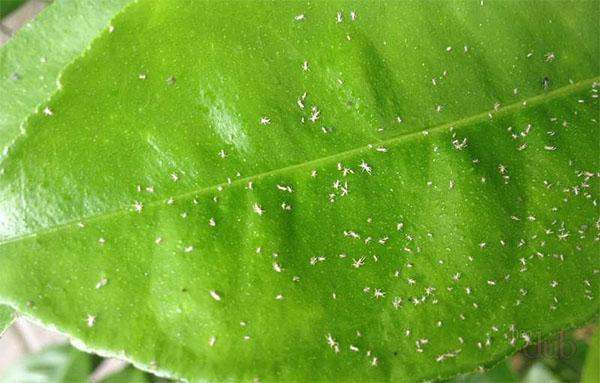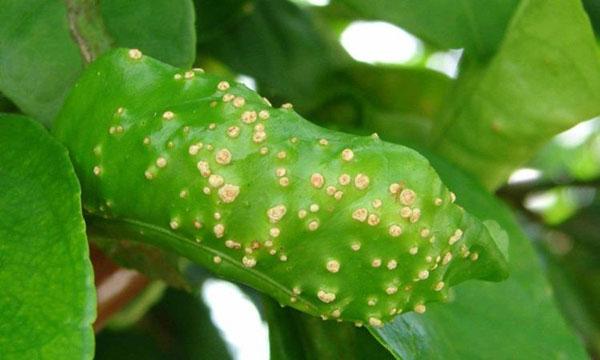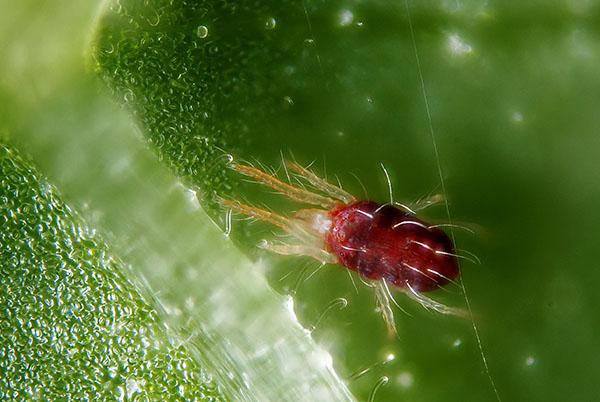Dangerous pests of citrus crops: acquaintance and methods of control
 Creating an exotic garden at home is truly a worthwhile endeavor. However, pests of citrus plants, imperceptible at first glance, can gradually destroy it. To protect the plantings from unexpected guests, it is most reasonable to get to know them better. It will not be superfluous to find a reliable weapon against them, and then put it into practice. Only then is there a chance to permanently get rid of insect attacks and enjoy exotic fruits.
Creating an exotic garden at home is truly a worthwhile endeavor. However, pests of citrus plants, imperceptible at first glance, can gradually destroy it. To protect the plantings from unexpected guests, it is most reasonable to get to know them better. It will not be superfluous to find a reliable weapon against them, and then put it into practice. Only then is there a chance to permanently get rid of insect attacks and enjoy exotic fruits.
The most popular pests of citrus crops

Most often, citrus crops affect:
- spider mite;
- aphid;
- shield;
- mealybug.
Unfortunately, citrus pests try to lead an inconspicuous lifestyle. They disguise themselves in every possible way against the background of dense greenery, shoots and even the root system. However, attentive gardeners easily remove masks from them, after which they strike with reliable weapons.
It is not always convenient to use chemicals at home to destroy pests. Therefore, experts recommend constantly monitoring the plant in order to neutralize them in time.
Spider mite is in a hurry to feast on "vitamins"
 Insidious pests, approximately 0.4 mm in size, settle on the back of the leaf plate. Outwardly, they resemble miniature spiders that sit serenely on a plant. It is almost impossible to notice them with the naked eye. Only thin threads of a web indicate their presence and activity. But how to deal with spider mites on citrus plants so as not to harm the culture.
Insidious pests, approximately 0.4 mm in size, settle on the back of the leaf plate. Outwardly, they resemble miniature spiders that sit serenely on a plant. It is almost impossible to notice them with the naked eye. Only thin threads of a web indicate their presence and activity. But how to deal with spider mites on citrus plants so as not to harm the culture.
If you do not respond in time to the presence of insects, the leaf plates will first become covered with spots of white-yellow color, then turn yellow, curl up and fall off.
There are several ways to eliminate spider mites:
- sulfur in the form of a powder is poured into a small gauze bag and all parts of the plant are sprinkled;
- the laundry soap is diluted with water and a plentiful "shower" of the affected foliage is arranged;
- since the spider mite is afraid of ultraviolet radiation, the culture is placed for several minutes under a special lamp;
- the affected areas are treated with isopropyl alcohol, which kills intruders.
Using rubbing alcohol to fight the mite, gently wipe the back of the sheet with a cotton swab to avoid burns.
In addition, the stores sell special preparations for the destruction of spider mites. They are not only of a chemical nature, but also of natural origin. After the procedure, the culture is closely monitored. Some eggs may survive, leading to the revival of pests. For prevention, the complex is repeated after 5 days. One drug is used no more than 4 times, since ticks quickly get used to it, developing immunity.
Soft-bodied aphids and "sweet" citrus juice
 If you enlarge this insect several tens of times, it can seem quite cute. However, the appearance of aphids on the home lemon brings a lot of problems to gardeners. The insect multiplies quickly, so it needs an abundance of food. Whole aphid colonies stick around the delicate shoots of the plant and actively suck out the juice from it.To prevent pest attacks, the tree is washed with a pressure of warm water.
If you enlarge this insect several tens of times, it can seem quite cute. However, the appearance of aphids on the home lemon brings a lot of problems to gardeners. The insect multiplies quickly, so it needs an abundance of food. Whole aphid colonies stick around the delicate shoots of the plant and actively suck out the juice from it.To prevent pest attacks, the tree is washed with a pressure of warm water.
When performing the procedure, it is advisable to cover the soil of the flowerpot with a film.
When aphids first appear, use a soapy solution. It is prepared from laundry, tar or green soap. 10 g of raw materials are placed on 1 liter of warm water. Then, using a cotton swab, thoroughly wipe the affected areas of the citrus culture. After a week, the procedure is repeated. Thanks to this, the soft-bodied aphid on the lemon, the photo of which is shown above, will disappear forever.
Garlic water helps to get rid of the pest. It is prepared simply:
- grind the head garlic;
- pour a glass of boiling water;
- insist 48 hours.
The solution is used to spray the tree for a week at intervals - every other day. But, how to treat lemon from pests to get instant results? A reliable remedy is Dichlorvos. Before the procedure, the culture is placed in a plastic bag. Then cotton wool, abundantly moistened with the preparation, is dipped there, closed and kept for about 5 hours. The treated leaves are washed thoroughly with clean warm water.
The dangerous "culprit" of citrus crops is the scale insect
 The first sign of the appearance of a pest is considered to be bulges on the leaf plates and branches of the plant. On average, their length reaches 4 mm, which is visible with the naked eye. Usually insects choose suitable places and stick to them. The provided photo of a scale insect on a lemon clearly demonstrates the vital activity of this pest.
The first sign of the appearance of a pest is considered to be bulges on the leaf plates and branches of the plant. On average, their length reaches 4 mm, which is visible with the naked eye. Usually insects choose suitable places and stick to them. The provided photo of a scale insect on a lemon clearly demonstrates the vital activity of this pest.
Biologists distinguish several types of scale insects:
- black;
- spotted;
- yellow-brown;
- patterned;
- oval;
- round.
Since the insect creates a wax shield around itself, it is rather difficult to deal with it. Therefore, the first sign of the presence of scale insects on tangerines is sticky leaves that resemble sweet syrup. Over time, the culture weakens and can dry out completely.
Chemicals will help get rid of a dangerous enemy:
- Aktara;

- Fitoverm;
- Actellik.
After treatment, the culture absorbs the insecticide, and its juice becomes fatal to the scale insect. The procedure is carried out at least 3 times with an interval of 15 days. The top layer of soil is removed, replacing it with fresh soil.
Unfortunately, the fruits of the processed crop are unsuitable for food.
You can fight the shield in other ways. For example, lemon or tangerine leaves are washed several times a day with tobacco tincture (50 g of raw materials are diluted in 1 liter of warm water, kept for 2 days).
Also, the affected leaves are treated with a solution prepared from the following components:
- anabazine sulfate;
- green soap;
- warm water.
After a day, it is washed off with clean water. The procedure is repeated after 7 days. An equally effective remedy is a kerosene-soap emulsion, which is used to spray citrus crops 2 times a week.
Mealybug Master of Disguise
 When someone finds worms in tangerines, the desire to eat them immediately disappears. Therefore, when growing citrus trees, it is important to carefully protect them from pests. The mealybug attack manifests itself in sugary secretions and a fluffy bloom on the leaf plates. Of course, the insect is wonderfully camouflaged in culture, and you will not immediately notice it.
When someone finds worms in tangerines, the desire to eat them immediately disappears. Therefore, when growing citrus trees, it is important to carefully protect them from pests. The mealybug attack manifests itself in sugary secretions and a fluffy bloom on the leaf plates. Of course, the insect is wonderfully camouflaged in culture, and you will not immediately notice it.
It sucks juice from such parts of it:
- young shoots;
- blossoming buds;
- leaves;
- root system.
This leads to stunted citrus growth and fruit damage. If larvae are observed in oranges, then the tree is affected by pests.
 When growing exotic plants at home, it is especially important to control room humidity. Its maximum level is up to 80%. Dried buds and leaves are immediately removed to prevent mealybugs from settling. In case of culture damage, special chemicals are used ("Decis", "Karbofos"). Folk remedies based on green soap, garlic and tobacco are also very popular.
When growing exotic plants at home, it is especially important to control room humidity. Its maximum level is up to 80%. Dried buds and leaves are immediately removed to prevent mealybugs from settling. In case of culture damage, special chemicals are used ("Decis", "Karbofos"). Folk remedies based on green soap, garlic and tobacco are also very popular.
As you can see, no matter what pests of citrus plants you have to fight, there is always a chance to come out the winner. For this, it is important to know well your enemies: habits, appearance and places of "deployment". As well as effective methods of struggle. No dangerous insect can resist such a weapon.